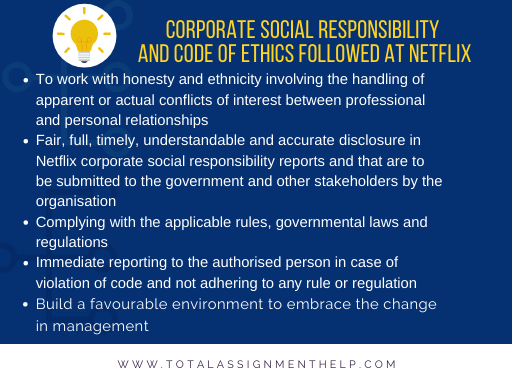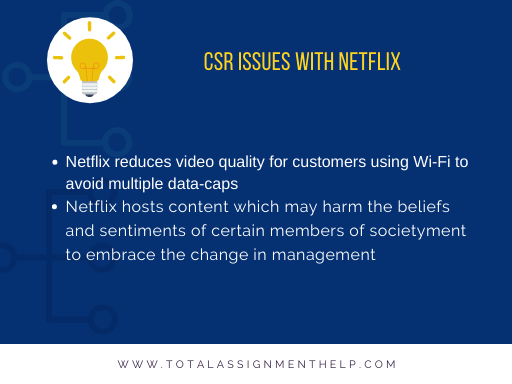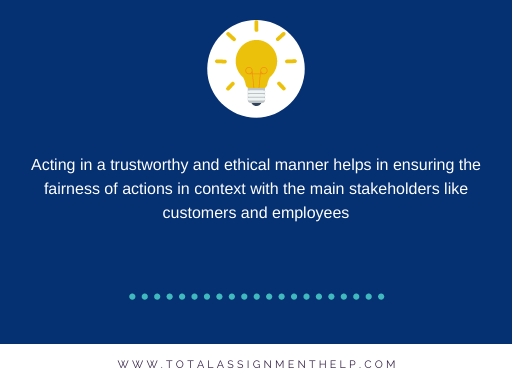Discussion On Netflix Corporate Social Responsibility Practices
Question
Task: Conduct a literature review around Netflix corporate social responsibility and business ethics issues and critically evaluate the CSR practices of the case utilizing the relevant theories.
Answer
Introduction
The proposed study is responsible for discussing the several aspects of Netflix corporate social responsibility. The concept of Corporate Social Responsibility (CSR) and ethics is an emerging and considerable responsibility of all type of organisations. This is the result of increased sensitivity towards social welfare and corporate wrongdoing. These two concepts may help in generating competitive advantages and benefits for the businesses. Further, the business organisations are also expected to perform all business-related activities while following ethical behavior towards employees, customers, other stakeholders and everyone associated with the business either in a direct or indirect manner (de Jong and van der Meer, 2017). This paper is detailing about both these concepts in relation to a small business or organisations like Netflix corporate social responsibility. The better reputation/public image, healthier and strong relations with the community, greater loyalty among customers can be added as benefits into the socially responsible business (Lange and Bundy, 2018). The importance of applying CSR and business ethics and the challenges faced by organisations are also discussed. Based on the findings, some recommendations are also provided that can be adopted by organisations and their managers to adopt CSR and business ethics while minimizing the challenges and issues. In the end, a conclusion is drawn summating the main findings of the paper. All information and data are derived from the authenticated resources like journal papers and research articles to increase the accuracy of results.
Literature Review
Corporate social responsibility is a very common term having a close relationship with business ethics. It is a continuous commitment by an organisation to work ethically and contributing towards the development of economy and society along with improving the quality of life of the employees their family members, local societal members, and the entire community. In the opinion of Pisani, et al., (2017), CSR is not a business function like marketing or accounting, it is related to the presentation of an organisation's soul including principles and values. These are being represented in several ways like the increased engagement of the stakeholders, local community, employees and target customers. The organisation and management should also take important decisions focusing on their impact on society and not only focusing on increased profitability from such decisions. CSR can also be reflected as to how an organisation treats its stakeholders including customers, suppliers, employees, shareholders, business environment and community.
According to Ojasoo (2016), every organisation is required to have an encounter with the problem that how it can motivate its employees regularly and influence them to give their best without making any mental pressure. It has been observed on a constant basis that employees feel highly motivated if they see that organisational resources are distributed fairly and all employees are treated in an equal manner without making any difference on the basis of culture, sex, races and so on. There are mainly two contexts on the basis of which it can be estimated that the organisation is fairly distributing its resources or not. These are named as distributive fairness and procedural fairness. The first one is based on the perceptions and outcomes of the individuals assume they want. Procedural fairness is concerned about the procedure or processes that help in creating outcomes.
Abdulaziz-Alhumaidan and Ahman (2019) states that due to the globalisation of the economy, international level organisations are getting involved with the customers and suppliers around the world especially when the organisation is working in a developing country. The agenda of Netflix corporate social responsibility is closely linked with international economic and social development. In the opinion of Fayyaz, et al. (2017), CSR in international organisations, is termed as a vehicle that can help in the increased contribution of the well-known corporations in the developing countries by operating responsibly in terms of environmental and social issues. However, the promoted corporate social responsibility in the developing economies by global organisations cannot be considered as real CSR. As per the statistics and reports, it is clear that most of the large scale organisations abuse the concept of CSR by behaving irresponsibly and unethically towards both environment and society in form of increased pollution of soil and water, toxic emissions and increased use of natural resources.
Elms, et al., (2019) states that, in the industry of social media and entertainment, Netflix corporate social responsibility is becoming a critical issue to be followed by the organisations as their main focus in on attracting customers and thus, increasing the profitability of the business. However, the maximization of profits should not be done on the cost of social and environmental hazards. In the case of online web applications like Amazon Prime, Voot, Netflix, it is being observed that organisations are regularly engaged in showing some sensitive content in form of web series which attract the youth and results in increased subscriptions. However, this is a direct violation of Netflix corporate social responsibility as this type of unethical and sensitive connect affects the mindset of viewers either positively and negatively. The cases of having a negative impact are more in comparison to positive impact. This is resulting in leaving a bad image of these organisations and creating allegations on the management from time to time. However, the organisations are also taking some corrective actions as a part of CSR to improve its reputation among potential customers in the target market. For example, Netflix, after getting the title of an online giant in streaming videos announced unlimited and paid parental leaves to its employees. This helps the organisation to retain its female employees and generating some positive response from the markets as well as from its employees in the form of a good employer.
What are the Netflix Corporate Social Responsibility and ethics?
In the working environment, the organisation prides itself on following morality, business standards, and ethics. The Netflix corporate social responsibility has provided a general code of conducts to its employees which can be defined as follows:

- To work with honesty and ethnicity involving the ethical handling of apparent or actual conflicts of interest between professional and personal relationships.
- Fair, full, timely, understandable and accurate disclosure in Netflix corporate social responsibility reports and that are to be submitted to the government and other stakeholders by the organisation.
- Complying with the applicable rules, governmental laws and regulations.
- Immediate reporting to the authorised person in case of violation of code and not adhering to any rule or regulation (Ciejka, 2018).
The employees of Netflix are fully dedicated to the development and betterment of the organisation due to having pliable regulations and a relaxed working environment. There is feasibility about the dress code and employees also receive a number of vacations and holidays. This helps in motivating employees to work with dignity and diligently and give their best. In addition to this, the benefits packages are also provided to the staff members to ensure that they are not feeling overburdened and happy with the organisational environment (Chang and Shim, 2017).
The Netflix corporate social responsibility and code of ethics implied by the organisation helps in ensuring that whether it is making a substantial profit in an honorable and clean manner or not. It is also influenced that staff members remain to adhere to the ethical values so that they can be seen as respectable. Teamwork in Netflix is considered the foundation of a positive working environment. This is strongly encouraged to maintain a peaceful and calm workplace (Lindgreen, et al., 2017).
While dealing with the community, it has ventured by providing charities and student scholarships. However, the management is awarding many Ph.D. students currently to help them in dealing with their financial situations. The social corporate social responsibility of Netflix includes encompassing ethical, legal and discretionary expectations of the society at every point of time. This is related to giving back to society in returning to consuming its resources. Netflix corporate social responsibility is aware of the same, and thus it is involved in organising food drives in the local communities, donating food and emergency relief funds to the needy (Dubuque, 2017).
While conducting market analysis, customer's feedback indicates that they prefer to watch shows and series on Netflix due to the quality of its high services. However, some also indicate that due to having some adult and sensitive content on Netflix, they are not able to allow their children to use Netflix. In addition to this, the sensor board of many developed and developing economies have sometimes imposed allegations on Netflix corporate social responsibility for the same reason. However, Netflix was able to deal with all such allegations by providing proper justification and proof of the permission of showing such type of content.
CSR issues faced by Netflix
One of the considerable ethical issues faced by Netflix corporate social responsibility is the throttling problem. The quality of videos is reduced by the organisation for the customers streaming through a Wi-fi network. This function is developed to help the customers to avoid multiple data caps. This is resulting in creating ethical issues and users are not able to enjoy the high video quality even after paying subscription charges. In addition to this, Netflix is getting popular among youth due to its interesting content. But there are also some videos and series including sensitive content or content which should not be visible to the society as it may be against the social and cultural values of the users. As Netflix corporate social responsibility is also providing services in the cultural and highly religious countries like India, it becomes the responsibility of the management to develop content that may not abuse or disrespect any culture of the ethical value of the customers (Mascarenhas, 2019). These issues can be better explained by using Stakeholder's Theory:

Stakeholders can be defined as such groups and individuals with which, the organisations are required to interact at every level and affected by organisational actions on a large level. the stakeholders are highly capable to provide advantages or damage to a business. The stakeholders' theory can be defined as a model of ethical management within an organisation. This theory has a direct link with Netflix corporate social responsibility and ethical implications within an organisation either working at a small or large level. Following this theory, the organisation is required to keep the primary focus on serving stakeholder's interests. Acting in a trustworthy and ethical manner helps in ensuring the fairness of actions in context with the main stakeholders like customers and employees. It may also the organisation for developing trust-based relationships to ensure long term profit, For example, Netflix is required to ensure that any of the content available may not leave a bad impact on youth or adults as it may lead to force them towards unethical acts. Focusing on such types of issues is important to prevent the organisation to face potential damage in the long run.

The decision-making practices can also be improved by adopting belief system theory within the organisation. This theory states that while making important decisions, ideologies and beliefs plays an important role. In case of making ethical and social decisions, Netflix is required to consider the beliefs and attitudes of customers as they are the main stakeholders of the organisation. It should try to show such type of web content which may not be against their beliefs and cultural values.
Conclusion
Based on the above analysis, it is clear that business ethics and Netflix corporate social responsibility, both works as an integral part of a business organisation irrespective of its scale of working and operations. Both concepts are based on this thought that an organisation is primarily responsible for society as it can make a profit by using environmental and societal resources. Thus, the main focus of the organisation should be on the satisfying needs and requirements of society in which it operates. It should also require to ensure that any act or services provided by the organisation may not harm society. This paper is analysing the importance of corporate social responsibility in relation to a well -known service provider in the entertainment sector named as Netflix. A detailed literature review in CSR and ethics is conducted in general. The main Netflix corporate social responsibility and ethical practices adopted by the company are defined in this report along with defining the main issues in relation to stakeholder theory. The findings indicate that Netflix is working well and adhering to its Corporate, social and ethical responsibility. However, it needs to focus on the above-identified issues to deal to avoid any type of Netflix corporate social responsibility allegations from stakeholders.
References
Abdulaziz-Alhumaidan, A. and Ahmad, N.H. (2019). DOES TACTICAL LEVEL HAVE A ROLE ON CSR PRACTICES?. International Journal of Accounting, 4(20), pp.1-13. Available at: http://www.ijafb.com/PDF/IJAFB-2019-20-06-01.pdf.
Chang, K., Li, Y. and Shim, H. (2017). Does Trustworthiness Influence Creditworthiness?—A Global Study of Corporate Social Responsibility Effect on Credit Rating. Netflix corporate social responsibility In FMA Annual Meeting, Boston, MA, USA (pp. 11-14). Available at: http://www.fmaconferences.org/Boston/TrustCSRCreditRatingFMA2017.pdf.
Ciejka, D. (2018). Worth Watching?: Assessing the Financial and Operational Health of Netflix. Available at: https://digitalcommons.assumption.edu/cgi/viewcontent.cgi?article=1039&context=honorstheses.
de Jong, M.D. and van der Meer, M. (2017). How does it fit? Exploring the congruence between organizations and their corporate social responsibility (CSR) activities. Journal of business ethics, 143(1), pp.71-83. Available at: https://link.springer.com/article/10.1007/s10551-015-2782-2.
Dubuque, I.A. (2017). RESEARCH UNDER REVIEW (Doctoral dissertation, School of Journalism and Communication, University of Oregon). Available at: http://www.matthewpittman.net/wp-content/uploads/2019/05/Matthew-Pittman-CV.pdf.
Elms, H., Kurdyukov, R., Preuss, L., Golob, U., Zaharia, R.M., Jalsenjak, B., Bulatova, J., Hardy, P., Burg, R., Noveskaite, A. and Ralko, O.S., (2019). Higher education institutions as catalysts for CSR discourse? Assessing CSR teaching and research in Central and Eastern Europe. In CSR COMMUNICATION CONFERENCE (p. 210). Available at: http://csr-com.org/img/upload/proceedings2019_final.pdf#page=230.
Fayyaz, A., Lund-Thomsen, P. and Lindgreen, A. (2017). Industrial clusters and CSR in developing countries: the role of international donor funding. Journal of Business Ethics, 146(3), pp.619-637. Netflix corporate social responsibility Available at: https://link.springer.com/article/10.1007/s10551-015-2940-6.
Lange, D. and Bundy, J. (2018). The Association between Ethics and Stakeholder Theory', Sustainability, Stakeholder Governance, and Corporate Social Responsibility (Advances in Strategic Management, Volume 38) (pp. 365-387). Emerald Publishing Limited. Available at: https://www.emerald.com/insight/content/doi/10.1108/S0742-332220180000038019/full/html.
Lindgreen, A., Vanhamme, J., Watkins, R. and Maon, F. eds. (2017). Communicating corporate social responsibility in the digital era. Routledge. Available at: https://books.google.com/books?hl=en&lr=&id=NtZCDwAAQBAJ&oi=fnd&pg=PT15&dq=CSR+and+ethics+of+Netflix&ots=k5BY5wcJrT&sig=A6YS8row5ir9DSgt0Y5oY8Va_NY.
Mascarenhas, O. (2019). Corporate Ethics for Turbulent Markets: Executive Response to Market Challenges. Emerald Group Publishing. Available at: https://books.google.com/books?hl=en&lr=&id=IBOUDwAAQBAJ&oi=fnd&pg=PP1&dq=CSR+and+ethics+of+Netflix&ots=U3jZiTYnst&sig=eXA68LsSINQ-ZxXVR8xGDPpYXTY.
Ojasoo, M. (2016). CSR reporting, stakeholder engagement and preventing hypocrisy through ethics audit. Netflix corporate social responsibility Journal of Global Entrepreneurship Research, 6(1), p.14. Available at: https://link.springer.com/article/10.1186/s40497-016-0056-9.
Pisani, N., Kourula, A., Kolk, A. and Meijer, R. (2017). How global is international CSR research? Insights and recommendations from a systematic review. Journal of World Business, 52(5), pp.591-614. Available at: https://www.sciencedirect.com/science/article/pii/S1090951617304388.












